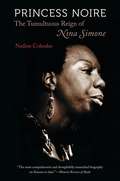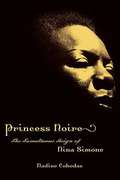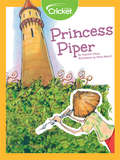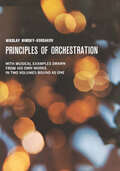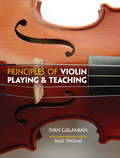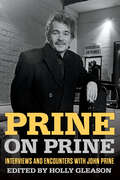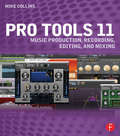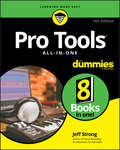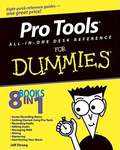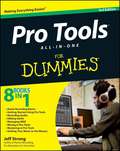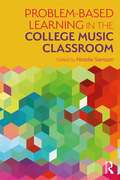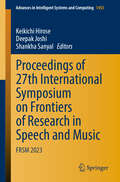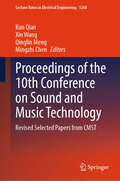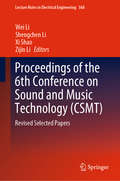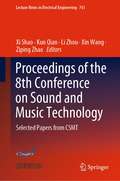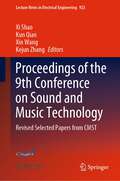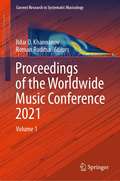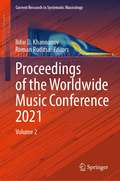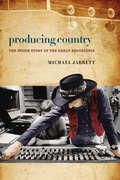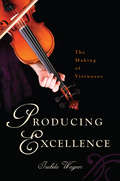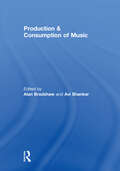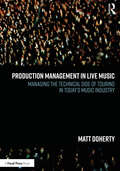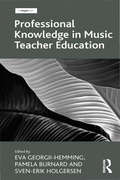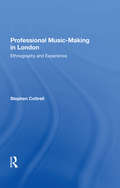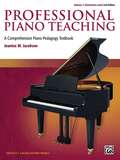- Table View
- List View
Princess Noire
by Nadine CohodasBorn Eunice Waymon in Tryon, North Carolina, Nina Simone (1933-2003) began her musical life playing classical piano. A child prodigy, she wanted a career on the concert stage, but when the Curtis Institute of Music rejected her, the devastating disappointment compelled her to change direction. She turned to popular music and jazz but never abandoned her classical roots or her intense ambition. By the age of twenty six, Simone had sung at New York City's venerable Town Hall and was on her way. Tapping into newly unearthed material on Simone's family and career, Nadine Cohodas paints a luminous portrait of the singer, highlighting her tumultuous life, her innovative compositions, and the prodigious talent that matched her ambition. With precision and empathy, Cohodas weaves the story of Simone's contentious relationship with audiences and critics, her outspoken support for civil rights, her two marriages and her daughter, and, later, the sense of alienation that drove her to live abroad from 1993 until her death. Alongside these threads runs a more troubling one: Simone's increasing outbursts of rage and pain that signaled mental illness and a lifelong struggle to overcome a deep sense of personal injustice.
Princess Noire: The Tumultuous Reign of Nina Simone
by Nadine CohodasTapping into newly unearthed material--including family and musical stories never before told--Cohodas presents a luminous portrait of Nina Simone.
Princess Piper
by Charnan SimonOn the day of her christening, Princess Piper was given the gift of music. When a wicked wizard begins kidnapping princesses, Piper decides to start rescuing them. Using her magical musical talents, Piper faces many trials and tests. Can she save the kidnapped princesses?
Principles of Orchestration
by Nikolai Rimsky-Korsakov"To orchestrate is to create, and this cannot be taught," wrote Nikolay Rimsky-Korsakov, the great Russian composer whose genius for brilliant, highly colored orchestration is unsurpassed. But invention, in all art, is closely allied to technique, and technique can be taught. This book, therefore, which differs from most other texts on the subject because of its tremendous wealth of musical examples and its systematic arrangement of material according to each constituent of the orchestra, will undoubtedly be of value to any music student. It is a music classic, perhaps the only book on classical orchestration written by a major composer.In it, the composer aims to provide the reader with the fundamental principles of modern orchestration from the standpoint of brilliance and imagination, and he devotes considerable space to the study of tonal resonance and orchestral combination. In his course, he demonstrates such things as how to produce a good-sounding chord of certain tone-quality, uniformly distributed; how to detach a melody from its harmonic setting; correct progression of parts; and other similar problems.The first chapter is a general review of orchestral groups, with an instrument-by-instrument breakdown and material on such technical questions as fingering, range, emission of sound, etc. There follows two chapters on melody and harmony in strings, winds, brasses, and combined groups. Chapter IV, Composition of the Orchestra, covers different ways of orchestrating the same music; effects that can be achieved with full tutti; tutti in winds, tutti pizzicato, soli in the strings, etc.; chords; progressions; and so on. The last two chapters deal with opera and include discussion of solo and choral accompaniment, instruments on stage or in the wings, technical terms, soloists (range, register, vocalization, vowels, etc.), voices in combination, and choral singing. Immediately following this text are some 330 pages of musical examples drawn from "Sheherazade," the "Antar Symphony," "Capriccio Espagnol," "Sadko," "Ivan the Terrible," "Le Coq d'Or," "Mlada," "The Tsar's Bride," and others of Rimsky-Korsakov's works. These excerpts are all referred to in the text itself, where they illustrate, far better than words, particular points of theory and actual musical practice. They are largely responsible for making this book the very special (and very useful) publication it is.This single-volume edition also includes a brief preface by the editor and extracts from Rimsky-Korsakov's 1891 draft and final versions of his own preface, as well as an appendixed chart of single tutti chords in the composer's works.
Principles of Violin Playing and Teaching
by Stephanie Chase Ivan Galamian Sally ThomasA celebrated instructor explains his philosophy of teaching and practice methods, including the appropriate combination of technique and interpretation. Ivan Galamian, a longtime Juilliard professor, incorporates aspects of both the Russian and French schools in a system both ingenious and logical. His tutelage has produced astonishing results with students, many of whom rank among the world's most acclaimed concert artists and orchestral concertmasters.Suitable for violin teachers and students of all ages and levels, this guide presents general principles and offers practical suggestions related to posture, holding the instrument and bow, vibrato movements, intonation, tone production, bowing patterns, double stops, trills, and many other facets of playing and practice. This edition features a new Introduction by Sally Thomas, violin virtuoso and Galamian's former student.
Prine on Prine: Interviews and Encounters with John Prine (Musicians in Their Own Words #20)
by Holly Gleason"As close to an autobiography as we're going to get from John Prine, Prine on Prine captures the inimitable, whimsical voice of one of our greatest songwriters . . . Nashville legend Holly Gleason knew the man and assembled this brilliant collection with a knowing eye and loving heart." —Joel Selvin, author of Fare Thee Well: The Final Chapter of the Grateful Dead's Long, Strange Trip and other booksCurated by a critic who knew him across five decades, Prine on Prine distills the essence of an iconic American writer: unguarded, unfiltered and real. In his own words, in his own time—on the road, in the kitchen, the Library of Congress, radio shows, movie scripts, and beyond. John Prine hated giving interviews, but he said much when he talked. Embarrassed by fame, delighted by the smallest things, the first songwriter to read at the Library of Congress, and winner of the Pen Award for Literary Excellence, Prine saw the world unlike anyone else. The songs from 1971's John Prine remain spot-on takes of the human condition today, and his writing only got richer, funnier, and more incisive. The interviews in Prine on Prine trace his career evolution, his singular mind, his enduring awareness of social issues, and his acute love of life, from Studs Terkel's radio interviews from the early '70s to Mike Leonard's Today Show packages from the '80s, Cameron Crowe's early encounter to Ronni Lundy's Shuck Beans, Stack Cake cookbook, and Hot Rod magazine to No Depression's cover story, through today. Editor Holly Gleason enjoyed a longstanding relationship with Prine and his longtime co-manager, and she often traveled with him on tours in the late 1980s and represented him in the 2000s.
Pro Tools 11: Music Production, Recording, Editing, and Mixing
by Mike CollinsHone your Pro Tools music production skills and create better tracks with Pro Tools 11: Music Production, Recording, Editing, and Mixing. With Pro Tools 11, you’ll get more than descriptions of Pro Tools features and menus—this book grounds its Pro Tools instruction thoroughly in real-world music production. Learn to leverage this powerful DAW and bend it to your will, whether you’re recording and mixing a band or producing a dance track. Get tips that will save you time, even if you’re an old hand at Pro Tools. Extensive full-color screenshots visually guide you through the book, and an informal writing style keeps you engaged. Includes coverage of additional features incorporated into version 10.3.6, which can be co-installed alongside Pro Tools 11 to allow use of TDM and RTAS plug-in formats. Author Mike Collins, an independent music producer and music technology consultant who has worked with Pro Tools since 1991, gives you a frank view of the software without the hype. This book is carefully designed for users with basic music production experience or knowledge, but can serve as a quick learning guide for ambitious beginners or as a reference for the advanced or professional user. Pro Tools 11 includes coverage of the application’s new features, including: Avid Audio Engine Dynamic Host-based Plug-in Processing Low-latency Input Buffer Offline Bounce Unified Workspace Browser Advanced Metering for Pro Tools HD 11 Co-Install with Pro Tools 10.3.6 Level: Intermediate
Pro Tools All-In-One For Dummies
by Jeff StrongA complete Pro Tools reference - from recording to mixing to mastering Pro Tools has long been the recording industry's leading solution for capturing, mixing, and outputting audio. While it was once a tool known and used exclusively by engineers in pro studios, it is now readily available to anyone wishing to create their own recording. This updated edition of Pro Tools All-in-One For Dummies covers the features you’ll encounter in both Pro Tools | First as well as the versions designed for next-level recording. It guides you through the very basics of recording, capturing both live and digital instruments, how to sweeten your sound in mixing, and how to tweak and output your final master. Now get ready to make some beautiful sounds! Get up to speed with recording basics Pick the Pro Tools version that works for you Record acoustic audio Get to know MIDI Discover how to set compression and EQ Sweeten your final product with mastering Create a final file you can stream online Assuming no past experience with audio recording, this book shares the basics of recording and how to capture both live and digital instruments using Pro Tools.
Pro Tools All-in-One Desk Reference For Dummies
by Jeff StrongWhen you add Pro Tools to your home recording studio, you have the software used to create hit records. Throw in Pro Tools All-In-One Desk Reference For Dummies, Second Edition and you get the insight you need to capture your sounds, edit your tracks, create a mix, and master your songs for the world to hear. Add a generous helping of your own talent and you have the perfect recipe for music stardom.This fantastic eight-books-in-one package introduces you to Pro Tools audio- and MIDI-recording software and clues you in on basic multitrack recording techniques. You'll get wise to Pro Tools' many features and functions and find out how top recording studios use them to create the biggest hits on the planet. This do-it-now handbook also gets you up to speed on the essential audio-engineering skills you need to make ultra-high-quality recordings. Discover how to:Navigate the Pro Tools windows and menusSave hours of experimenting and spend more time recordingMaster microphone placement and other home recording basicsEdit errors out of your tracksEqualize (EQ) tracks and add effectsWork with midi instrumentsBlend your sounds into a stunning final mixAssemble and release an albumDon't spend big bucks and many months taking classes in audio engineering and Pro Tools. Get eight quick-reference guides for one great price with Pro Tools All-In-One Desk Reference For Dummies, Second Edition and start recording your breakthrough album right away!
Pro Tools All-in-One For Dummies, 3rd Edition
by Jeff StrongA professional musician guides serious hobbyists through Pro Tool Pro Tools puts professional recording and music production software in the hands of anyone with the appropriate hardware and the knowledge to use it. Musician and recording engineer Jeff Strong guides you through the latest version of this complex program, offering twice the content of the official guide at a lower price. Eight minibooks cover recording basics, getting started with Pro Tools, recording audio, editing audio, managing MIDI, mixing, mastering, and getting your music to the masses. The latest version of Pro Tools offers a whole range of new possibilities for the recording artist; this soup-to-nuts guide explains everything you need to know to take full advantage of it Written by a professional musician and recording engineer who has authored two previous editions of this book as well as Home Recording For Musicians For Dummies and Drums For Dummies Eight minibooks cover recording basics, getting started with Pro Tools, recording audio, editing audio, managing MIDI, mixing, mastering, and distributing your music Explains how to configure your computer and attach hardware, proper microphone settings, steps for getting your music to sound the way you want, tips on putting your tracks together professionally, and much more If making music is your passion, Pro Tools All-in-One For Dummies, 3rd Edition is exactly what you need to start sharing your sounds with the world.
Problem-Based Learning in the College Music Classroom
by Natalie R SarrazinProblem-Based Learning in the College Music Classroom explores the core tenets of Problem-Based Learning (PBL). PBL is an effective, student-centered approach in which students learn higher-order thinking skills and integrative strategies by solving real-world challenges - not often employed in music classrooms. Yet such courses are uniquely situated to advance this innovative pedagogical approach. This volume sheds light on PBL best practices in survey- and topic-based music courses while integrating general education content, discussing implementation, materials, methods, and challenges, and encouraging readers to think creatively to develop flexible solutions for large-scale issues. Bookended by introductory and concluding chapters that delve into the history, theory, application, and assessment of PBL, the text collects classroom-tested case studies from eleven contributing authors in: Music History and Appreciation Ethnomusicology Music and Movement Music Theory and Education Problem-Based Learning in the College Music Classroom paves the way for pedagogical discovery in this unexplored area, encouraging teachers and graduate students to move curricula goals forward - and ultimately to move students toward innovation and engagement.
Proceedings of 27th International Symposium on Frontiers of Research in Speech and Music: FRSM 2023 (Advances in Intelligent Systems and Computing #1455)
by Keikichi Hirose Shankha Sanyal Deepak JoshiThis book features original papers from 27th International Symposium on Frontiers of Research in Speech and Music (FRSM 2023), jointly organized by Sardar Vallabhbhai National Institute of Technology, Surat, India, and Sir C.V. Raman Centre for Physics and Music, Jadavpur University, Kolkata, India, during 4–5 August 2023. The book is organized into four main sections, considering both technological advancement and interdisciplinary nature of speech, music, language and their applications. The first section includes chapters related to computational, modelling and cognitive aspects of the speech signal. The second part contains chapters covering the foundations of both vocal and instrumental music processing with the signal, computational and cognitive aspects. The third section relates to the variety of research being done in the peripheral areas of languages and linguistics with special focus on regional languages of India. A lot of research is being performed within the speech and music information retrieval domain which is potentially interesting for most users of computers and the Internet. Therefore, the fourth and final section is dedicated to the chapters related to multidisciplinary applications of speech and music signal processing.
Proceedings of the 10th Conference on Sound and Music Technology: Revised Selected Papers from CMST (Lecture Notes in Electrical Engineering #1268)
by Xin Wang Kun Qian Qinglin Meng Mingzhi ChenThe book presents selected papers at the 10th Conference on Sound and Music Technology (CSMT) held in June 2023, China. CSMT is a multidisciplinary conference focusing on audio processing and understanding with bias on music and acoustic signals. The primary aim of the conference is to promote the collaboration between art society and technical society in China. In this book, the paper included covers a wide range topic from speech, signal processing, music understanding, machine learning, and signal processing for advanced medical diagnosis and treatment applications, which demonstrates the target of CSMT merging arts and science research together. Its content caters to scholars, researchers, engineers, artists, and education practitioners not only from academia but also industry, who are interested in audio/acoustics analysis signal processing, music, sound, and artificial intelligence (AI).
Proceedings of the 6th Conference on Sound and Music Technology: Revised Selected Papers (Lecture Notes in Electrical Engineering #568)
by Wei Li Shengchen Li Xi Shao Zijin LiThis book discusses the use of advanced techniques to produce and understand music in a digital way. It gathers the first-ever English-language proceedings of the Conference on Sound and Music Technology (CSMT), which was held in Xiamen, China in 2018. As a leading event, the CSMT reflects the latest advances in acoustic and music technologies in China. Sound and technology are more closely linked than most people assume. For example, signal-processing methods form the basis of music feature extraction, while mathematics provides an objective means of representing current musicological theories and discovering new ones. Moreover, machine-learning methods include popular deep learning algorithms and are used in a broad range of contexts, from discovering patterns in music features to producing music. As these proceedings demonstrate, modern technologies not only offer new ways to create music, but can also help people perceive sound in innovative new ways.
Proceedings of the 8th Conference on Sound and Music Technology: Selected Papers from CSMT (Lecture Notes in Electrical Engineering #761)
by Xin Wang Xi Shao Kun Qian Li Zhou Ziping ZhaoThe book presents selected papers at the 8th Conference on Sound and Music Technology (CSMT) held in November 2020, at Taiyuan, Shanxi, China. CSMT is a multidisciplinary conference focusing on audio processing and understanding with bias on music and acoustic signals. The primary aim of the conference is to promote the collaboration between art society and technical society in China. In this proceeding, the paper included covers a wide range topic from speech, signal processing, music understanding, machine learning and signal processing for advanced medical diagnosis and treatment applications; which demonstrates the target of CSMT merging arts and science research together.its content caters to scholars, researchers, engineers, artists, and education practitioners not only from academia but also industry, who are interested in audio/acoustics analysis signal processing, music, sound, and artificial intelligence (AI).
Proceedings of the 9th Conference on Sound and Music Technology: Revised Selected Papers from CMST (Lecture Notes in Electrical Engineering #923)
by Xin Wang Xi Shao Kun Qian Kejun ZhangThe book presents selected papers at the 9th Conference on Sound and Music Technology (CSMT) held virtually in June 2022, organized by Zhejiang University, China. CSMT is a multidisciplinary conference focusing on audio processing and understanding with bias on music and acoustic signals. The primary aim of the conference is to promote the collaboration between art society and technical society in China. In this book, the paper included covers a wide range topic from speech, signal processing, music understanding, machine learning, and signal processing for advanced medical diagnosis and treatment applications, which demonstrates the target of CSMT merging arts and science research together. Its content caters to scholars, researchers, engineers, artists, and education practitioners not only from academia but also industry, who are interested in audio/acoustics analysis signal processing, music, sound, and artificial intelligence (AI).
Proceedings of the Worldwide Music Conference 2021: Volume 1 (Current Research in Systematic Musicology #8)
by Ildar D. Khannanov Roman RuditsaThis book presents sixteen chapters in Volume 1. This Volume I of the Proceedings of the Worldwide Music Conference 2021 offers a smorgasbord of scientific approaches to music. The congress is one of a kind; it is dedicated not to a specific field but to the interdisciplinary developments and the interaction with the representatives from actual scientific disciplines. The languages of mathematics, computer science, semiotics, palaeography, and medicine are in the mix; geography of the studies is also impressive—Greece, Mexico, China, Russia, India, Poland, and USA, to name just a few. The purpose of such juxtaposition is to see how the terminology, categorical apparatus, and interpretations of music vary from science to science and how this can enrich the terminology of music theory. They cover a wide range of topics that the editors divided into four subfields: music in interdisciplinary contexts, music and current technology, musical instruments and voice, and music pedagogy and medicine. The opening section of the Proceedings is thus dedicated to the idea of interdisciplinarity, relationship of creator of theory of harmony Rameau to sciences of his time, the idea of number in music, co-creation, and the category of musical network. Three more chapters here deal with Russian palaeography, Indian musical genre, and the idea of musical semiotics. It is a kind of opening statement from music theorists. Part two, music and current technology, united three chapters, on “zero gravity” concept in modern music, discussion of scales as mathematical networks, and the innovation in digital music making, transforming it from stationary to mobile applications. The third part, musical instruments and voice, is of special interest because it is in the study of the instruments, the design, acoustic characteristics, and tuning, and sciences have cooperated with music theory for centuries. In addition to instruments, one chapter here is dedicated to voice. The last part, musical pedagogy and medicine, takes the reader even further into the interdisciplinary domain. The Proceedings is written in standard English language, prepared for the pleasure of reading of wide circles of professionals in different fields. The purpose of the editors is to bring this rather diverse set of texts into the context of a fruitful dialogue.
Proceedings of the Worldwide Music Conference 2021: Volume 2 (Current Research in Systematic Musicology #9)
by Ildar D. Khannanov Roman RuditsaThis Volume II of the Proceedings of the Worldwide Music Conference 2021 continues the line of publications of the first volume in a highly interdisciplinary mode. This time, we offer eight chapters that provide the in-depth study of music in four large sub-fields: mathematics, language and theory of narrative, evolution and perception, and, finally, sociology. The first chapter, by Roman Ruditsa, is devoted to the study of structural pitch organization. This is based upon a formal logical interpretation of the idea of pitch. The chapter contains formal definitions of such objects as tones, intervals, and interval systems and a demonstration of the logical relationships that exist between them. The second chapter, in the same mathematical venue, by Celina Richter and Stefan E. Schmidt, revisits the millennial question of the essence of an interval, using highly advanced mathematical language, the categories of monoid and the algebraic theory of measurement. The next block is dedicated to language and narrative; the first chapter is by Vincent Meelberg. Here, the reader will find fascinating developments in the ongoing deliberations on this elusive category. The name of Trevor Rawbone, perhaps, does not need an introduction to those involved with cognitive studies of music. This time, his chapter deals with the idea of the language of musical thought, which shifts the traditional discussion of language into a very new dimension. Carlos Almada begins a new section in the book, the one dedicated to evolution and perception. He begins with Darwin and takes us through the exciting path of development of the science of evolution, which he masterfully connects to his model of derivative analysis of music. The question of psycho-physiological foundation of the ethnic hearing, raised in the chapter by Аlla V. Toropova and Irina N. Simakova, is a difficult one. The idea of ethnic character of music had been a part of traditional musicology and usually was expressed in specific language of humanities. The chapter by Daniil Shutko on the theoretical ideas of the legendary professor of St. Petersburg conservatory, Dr. Tatiana Bershadskaya, was difficult to put into any category. Her concept of music was truly universal and interdisciplinary. At the same time, the concept and Shutko’s description are as closely focused on music theory in a narrow and precise sense as possible. The art and culture of consumption of wine in correlation with the choice of music for listening is a theme for a true connoisseur. It becomes even more intriguing when the authors, Diego Pérez-Fuertes, Emma Juaneda-Ayensa and Cristina Olarte-Pascual, add to the discussion the special circumstance of the pandemic and the way human spirit meets this challenge in the most graceful way.
Producing Country: The Inside Story of the Great Recordings (Music/Interview)
by Michael JarrettMusicians make music. Producers make records. In the early days of recorded music, the producer was the "artists-and-repertoire man," or A&R man, for short. A powerful figure, the A&R man chose both who would record and what they would record. His decisions profoundly shaped our musical tastes. Don Law found country bluesman Robert Johnson and honky-tonk crooner Lefty Frizzell. Cowboy Jack Clement took the initiative to record Jerry Lee Lewis (while his boss, Sam Phillips, was away on business). When Ray Charles said he wanted to record a country-and-western album, Sid Feller gathered songs for his consideration. The author's extensive interviews with music makers offer the fullest account ever of the producer's role in creating country music. In its focus on recordings and record production, Producing Country tells the story of country music from its early years to the present day through hit records by Hank Williams, George Jones, Patsy Cline, Buck Owens, Dolly Parton, Johnny Cash, Loretta Lynn, Waylon Jennings, and Merle Haggard, among many others.Includes original interviews with producers Chet Atkins, Pete Anderson, Jimmy Bowen, Bobby Braddock, Harold Bradley, Tony Brown, Blake Chancey, Jack Clement, Scott Hendricks, Bob Johnston, Jerry Kennedy, Blake Mevis, Ken Nelson, Jim Ed Norman, Allen Reynolds, Jim Rooney, James Stroud, Paul Worley, and Reggie Young, among others.
Producing Excellence
by Izabela WagnerDriven by a passion for music, for excellence, and for fame, violin soloists are immersed from early childhood in high-pressure competitions, regular public appearances, and arduous daily practice. An in-depth study of nearly one hundred such children, Producing Excellence illuminates the process these young violinists undergo to become elite international soloists. A musician and a parent of a young violinist, sociologist Izabela Wagner offers an inside look at how her young subjects set out on the long road to becoming a soloist. The remarkable research she conducted--at rehearsals, lessons, and in other educational settings--enabled her to gain deep insight into what distinguishes these talented prodigies and their training. She notes, for instance, the importance of a family culture steeped in the values of the musical world. Indeed, more than half of these students come from a family of professional musicians and were raised in an atmosphere marked by the importance of instrumental practice, the vitality of music as a vocation, and especially the veneration of famous artists. Wagner also highlights the highly structured, rigorous training system of identifying, nurturing, and rewarding talent, even as she underscores the social, economic, and cultural factors that make success in this system possible. Offering an intimate portrait of the students, their parents, and their instructors, Producing Excellence sheds new light on the development of exceptional musical talent, as well as draw much larger conclusions as to "producing prodigy" in other competition-prone areas, such as sports, sciences, the professions, and other arts. Wagner's insights make this book valuable for academics interested in the study of occupations, and her clear, lively writing is perfect for general readers curious about the ins and outs of training to be a violin soloist.
Production & Consumption of Music
by Alan Bradshaw Avi ShankarThis collection considers music within the spheres of production and consumption and pulls together an interdisciplinary collection of music studies from around the world, ranging from an ethnomusicological analysis of the condition of Tibetan music and its role within the Chinese state, the changing reception of anti-apartheid music by white musicians in South Africa according to new configurations of society and its memory of recent history, a lyrical exploration of jazz as a signifier of crime and other nefarious activities within film history, an analysis of how music charts and maps the social network and gender roles in Jamaica and a landmark commentary on how music is framed by David Hemsondalgh. As opposed to other studies which explore music just in terms of its reception or its composition and distribution, this collection should make necessary reading for anybody interested in the wider nexus of music’s existence and how it waxes and wanes with ideology, politics, gender, business and much more besides.
Production Management in Live Music: Managing the Technical Side of Touring in Today’s Music Industry
by Matt DohertyProduction Management in Live Music: Managing the Technical Side of Touring in Today’s Music Industry is a handbook for the aspiring production manager looking to forge a career in the live music industry. This book outlines the role that a production manager performs and their key responsibilities, and takes the reader step by step through the entire process of preparing a show for a tour. From dealing with artists and management to hiring crew, from booking vendors and scheduling the day-to-day of a busy tour, this text covers everything that is needed to take the show into rehearsals and finally on the road. Every aspect of the job is covered, including the very important challenges that face today’s industry in the realms of sustainability, inclusion, diversity and mental health. Whether the show be on a festival, in a small theatre or club, or in a modern arena, this book clearly lays out the tasks and challenges and offers practical solutions to ensure the smooth running of a live performance. Production Management in Live Music is written for students in stage and production management courses and emerging professionals working in live music touring.
Professional Knowledge in Music Teacher Education
by Pamela BurnardThe complexity of the various forms of knowledge and practices that are encountered by teachers, university lecturers, teacher trainers, student teachers, policy makers and researchers, demands careful thought and reflection. Professional Knowledge in Music Teacher Education focuses on how knowledge is understood, what theories are held and the related assumptions that are made about teachers and learners, as well as how theory and practice can be understood, with useful and imaginative connections made between the two in music teacher education. Internationally renowned contributors address a number of fundamental questions designed to take the reader to the heart of current debates around knowledge, practice, professionalism, and learning and teaching in music as well as considering how all these elements are influenced by economic, cultural and social forces. The book demonstrates how research can inform pedagogical approaches in music teacher education; methods, courses and field experiences, and prepare teachers for diverse learners from a range of educational settings. The book will appeal to those interested in the development of appropriate professional knowledge and pedagogic practices in music teacher education.
Professional Music-making in London: Ethnography and Experience (Soas Musicology Ser.)
by Stephen CottrellProfessional Music-Making in London is an engaging yet innovative study which examines the lives and work of Western art musicians from an ethnographic perspective. Drawing in part on his own professional experience, Stephen Cottrell considers to what extent musicians in Western society conform to Alan Merriam's paradigmatic assessment of them as having low status yet high respect, as well as being given an unusual degree of licence to deviate from convention. The book draws on a wide variety of approaches from scholars elsewhere: from ethnomusicologists such as Bruno Nettl and Henry Kingsbury, performance theorists such as Richard Schechner and Victor Turner, as well as psychologists such as Sigmund Freud and Melanie Klein. This rich intellectual heritage provides the framework for discussion of a variety of themes, including how musicians conceive their self identity and how this is negotiated in the professional musical world; how the deputy system facilitates musical exchange and engenders gift relationships; how humour lubricates social and musical relationships and mitigates the stresses of musicians' lives; and how the events in which musicians participate can be viewed as quasi-rituals, and thus related to analogous events in non-Western cultures. The focus of this study is on professional music-making in London, one of the world's busiest centres of musical performance - yet the issues raised and explored are deeply relevant to other major centres of Western art music, such as New York, Berlin or Sydney. Ethnomusicologists, anthropologists, musicologists, performers, teachers and concert-goers will find this book a stimulating insight into, and investigation of, Western art musicians and their place in today's world.
Professional Piano Teaching: A Comprehensive Piano Pedagogy Textbook (Professional Piano Teaching #Vol 1)
by Jeanine M. JacobsonProfessional Piano Teaching offers a practical guide to the art of piano teaching. Volume 1, now available as an updated second edition, is an excellent introduction to the profession of teaching piano. This revised second edition has been expanded to include chapters on teaching adult students and teaching popular, sacred, and other familiar music. Designed to serve as a basic text for a first-semester or lower-division piano pedagogy course, it provides an overview of learning principles and a thorough approach to essential aspects of teaching elementary-level students. Special features include discussions on how to teach, not just what to teach; numerous musical examples; chapter summaries; and suggested projects for new and experienced teachers.
